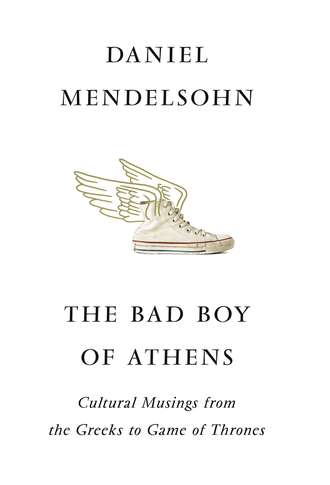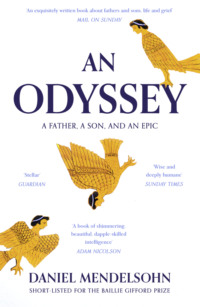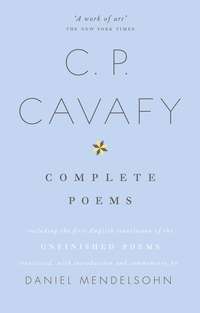
Полная версия
The Bad Boy of Athens: Classics from the Greeks to Game of Thrones
And yet perhaps, too, there was time for one more effort; perhaps he might have the last laugh. Perhaps, from a burlesque, a deliberate misinterpretation, a pandering by a comedian to the common taste in order to achieve a glib success, something worthwhile might result. Let us imagine this aged poet as he leaves Athens and embarks on his difficult northward journey, turning an idea over in his mind – an idea that comes to him, as it happens, from Thesmophoriazousae itself. An all-female festival; a man eager to see what the women get up to, when the men aren’t watching. A grotesque foray into drag that convinces no one; a masquerade that ends in apprehension, and terrible peril. Not a bad idea for a play – not a comedy, this time around, but something terrible, something that will bring his citizen audience close to the core of what great theatre is about: plotting, disguise, recognition, revelation, violence, awful knowledge. He arrives in Macedon and gets to work. Three years later, the play is finished: Bacchae. By the time it is produced back home in Athens, winning its author one of his rare first prizes, Euripides is dead. But from the mockers, those who wilfully mistake his meanings, he has stolen a victory. This show, it is safe to say, will go on.
– The New York Review of Books, 13 February 2003
Alexander, the Movie!
Whatever else you say about the career of Alexander the Great – and classicists, at least, say quite a lot (one website that tracks the bibliography lists 1200 items) – it was neither funny nor dull. So it was a sign that something had gone seriously wrong with Oliver Stone’s long, gaudy, and curiously empty new biopic about Alexander when audiences at both showings I attended greeted the movie with snickering and evident boredom. The first time I saw the picture was at a press screening at a commercial theatre, and even from the large central section that was (a personage with a headset informed us) reserved for ‘friends of the filmmaker’ you could hear frequent tittering throughout the film – understandable, given that the characters often have to say things like ‘from these loins of war, Alexander was born’. A week later, at a matinee, I got to witness a reaction by those unconstrained by the bonds of either duty or amity: by the end of the three-hour-long movie, four of the twelve people in the audience had left.
This was, obviously, not the reaction Stone was hoping for – nor indeed the reaction that Alexander’s life and career deserve, whether you think he was an enlightened Greek gentleman carrying the torch of Hellenism to the East or a savage, paranoid tyrant who left rivers of blood in his wake. The controversy about his personality derives from the fact that our sources are famously inadequate, all eyewitness accounts having perished: what remains is, at best, secondhand (one history, for instance, is based largely on the now-lost memoirs of Alexander’s general and alleged half-brother, Ptolemy, who went on to become the founder of the Egyptian dynasty that ended with Cleopatra), and at worst, highly unreliable. A rather florid account by the first-century-AD Roman rhetorician Quintus Curtius often reflects its author’s professional interests – his Alexander is given to extended bursts of eloquence even when gravely wounded – far more than it does the known facts. But Alexander’s story, even stripped of romanticizing or rhetorical elaboration, still has the power to amaze.
He was born in 356 BC, the product of the stormy marriage between Philip II of Macedon and his temperamental fourth wife, Olympias, a princess from Epirus (a wild western kingdom encompassing parts of present-day Albania). His childhood was appropriately dramatic. At around twelve he had already gained a foothold on legend by taming a magnificent but dangerously wild stallion called Bucephalas (‘Oxhead’) – a favourite episode in what would become, after Alexander’s death, a series of increasingly fantastical tales and legends that finally coalesced into a literary narrative known as the Alexander Romance, which as time passed was elaborated, illuminated, and translated into everything from Latin to Armenian. While still in his early teens, he was at school with no less a teacher than Aristotle, who clearly made a great impression on the youth. Years later, as he roamed restlessly through the world, Alexander took care to send interesting zoological and botanical specimens back to his old tutor.
At sixteen he’d demonstrated enough ability to get himself appointed regent when his father, a shrewd statesman and inspired general who dreamed of leading a pan-Hellenic coalition against Persia, was on campaign. He used this opportunity to make war on an unruly tribe on Macedon’s eastern border; to mark his victory he founded the first city he named after himself, Alexandropolis. At eighteen, under his father’s generalship, he led the crack Macedonian cavalry to a brilliant victory at the Battle of Chaeronea, where Macedon crushed an Athenian-Theban coalition, thereby putting an end to southern Greek opposition to Macedonian designs on hegemony. At twenty, following the assassination of Philip – in which he (or Olympias, or perhaps both) may have had a hand – he was king.
That, of course, was just the beginning. At twenty-two, Alexander led his father’s superbly trained army across the Hellespont into Asia. Next he liberated the Greek cities of Asia Minor from their Persian overlords (i.e., made them his own: the governors he appointed were not always champions of Hellenic civic freedoms), staged his most brilliant military victory by successfully besieging the Phoenician island fortress of Tyre (part of his famous strategy to ‘defeat the Persian navy on land’ by seizing its bases), and freed a grateful Egypt from harsh Persian suzerainty. While in Egypt, he indulged in one of the bizarre gestures that, wholly apart from his indisputable genius as a general, helped make him a legend: he made an arduous and dangerous detour to the oracle of Ammon in the desert oasis of Siwah, where the god revealed that Alexander was in fact his own son – a conclusion with which Alexander himself came increasingly to agree. While in Egypt he also founded the most famous of his Alexandrias, a city that eventually displaced Athens as the centre of Greek intellectual culture, and where his marvellous tomb, a tourist attraction for centuries after, would eventually rise.
Although Alexander had, apparently, set out simply to complete his father’s plan – that is, to drive the Persians away from the coastal cities of Asia Minor, which for centuries had been culturally Greek, ostensibly in retaliation for a century and a half of destructive Persian meddling in Greek affairs – it’s clear that once in Asia, he began to dream much bigger dreams. Within three years of crossing the Hellespont, he had defeated the Persian Great King, Darius III, in a series of three pitched battles – Granicus, Issus, and Gaugamela – in which he triumphed against sometimes dire odds. It was in the rout that followed Issus that Darius fled the field of battle, leaving his wife, children, and even his mother behind in the baggage train. Alexander, with characteristic largesse and fondness for the beau geste – like most extravagant personalities, he had a capacity for generosity as great as his capacity for ruthlessness – honourably maintained the captives in royal state.
His brilliant victory on the plain of Gaugamela in Mesopotamia in October, 331 BC, made him the most powerful man the world had ever known, ruler of territories from the Danube in the north, to the Nile valley in the south, to the Indus in the east. He was also the world’s richest person: the opulent treasuries of the Persians at Babylon, Susa, and Persepolis yielded him the mind-boggling sum of 180,000 silver talents – the sum of three talents being enough to make someone a comfortable millionaire by today’s standards.
After Gaugamela, Alexander, driven by a ferocious will to power or inspired by an insatiable curiosity (or both), just kept going. He turned first to the northeast, where he subdued stretches of present-day Afghanistan, Uzbekistan, and Tajikistan, and there took as a wife the beautiful Roxana, daughter of a local chieftain, much to the consternation of his xenophobic aides. Then he moved to the south, where his designs on India – he believed it to be bordered by the ‘Encircling Ocean’ which he longed to see – were thwarted, in the end, not by military defeat but by the exhaustion and demoralization of his men, who by that point, understandably, wanted to head back to Macedon and enjoy their loot. Himself demoralized by this failure in support, Alexander relented and agreed to turn back.
The westward return journey through the arid wastes of the Macran desert toward Babylon, which he planned to make the capital of his new world empire, is often called his 1812: during the two-month march, he lost tens of thousands of the souls who set out with him. That tactical catastrophe was followed by an emotional one: after the army regained the Iranian heartland, Alexander’s bosom companion, the Macedonian nobleman Hephaistion – almost certainly the King’s longtime lover, someone whom Alexander, obsessed with Homer’s Iliad and believing himself to be descended from Achilles, imagined as his Patroclus – died of typhus. (The two young men had made sacrifices together at the tombs of the legendary heroes when they reached the ruins of Troy at the beginning of their Asian campaign.) This grievous loss precipitated a severe mental collapse in the King, who had, in any event, grown increasingly unstable and paranoid. Not without reason: there were at least two major conspiracies against his life after Gaugamela, both incited by close associates who’d grown disgruntled with his increasingly pro-Persian policies.
Within a year, he himself was dead – perhaps of poison, as some have insisted on believing, but far more likely of the cumulative effects of swamp fever (he’d chosen, foolishly or perhaps self-destructively, to pass the summer in sultry, fetid Babylon), a lifetime of heavy drinking, and the physical toll taken by his various wounds. He was thirty-two.
There can be no doubt that the world as we know it would have a very different shape had it not been for Alexander, who among other things vastly expanded, through his Hellenization of the East, the reach of Western culture, and thus prepared the soil, as it were, for Rome and then Christianity. But as extraordinarily significant as this story is, little of it would be very interesting to anyone but historians and classicists were it not for a rather curious additional factor of what the Greeks called pothos – ‘longing’. The best and most authoritative of the ancient sources for Alexander’s career are the Anabasis (‘March Up-Country’) and Indica (‘Indian Affairs’) by the second-century-AD historian and politician Arrian, a Greek from Nicomedia (part of the Greek-speaking East that Alexander helped to create) who was a student of Epictetus and flourished under the philhellene emperor Hadrian. Throughout his account of Alexander’s life, the word pothos recurs to describe the yearning that, as the historian and so many others before and after him believed, motivated Alexander to seek far more than mere conquest.
The word is used by Arrian of Alexander’s yearning to see new frontiers, his dreamy desire to found new cities, to loosen the famous Gordian knot, to explore the Caspian Sea. It is used, significantly, to describe his striving to outdo the two divinities with whom he felt a special bond, Herakles and Dionysos, in great deeds. An excerpt from the beginning of the final book of Arrian’s Anabasis nicely sums up the special quality that the pothos motif lends to Alexander’s life, making its interest as much literary, as it were, as historical:
For my part I cannot determine with certainty what sort of plans Alexander had in mind, and I do not care to make guesses, but I can say one thing without fear of contradiction, and that is that none was small and petty, and he would not have stopped conquering even if he’d added Europe to Asia and the Britannic Islands to Europe. On the contrary, he would have continued to seek beyond them for unknown lands, as it was ever his nature, if he had no rival, to strive to better the best.
Конец ознакомительного фрагмента.
Текст предоставлен ООО «ЛитРес».
Прочитайте эту книгу целиком, купив полную легальную версию на ЛитРес.
Безопасно оплатить книгу можно банковской картой Visa, MasterCard, Maestro, со счета мобильного телефона, с платежного терминала, в салоне МТС или Связной, через PayPal, WebMoney, Яндекс.Деньги, QIWI Кошелек, бонусными картами или другим удобным Вам способом.






